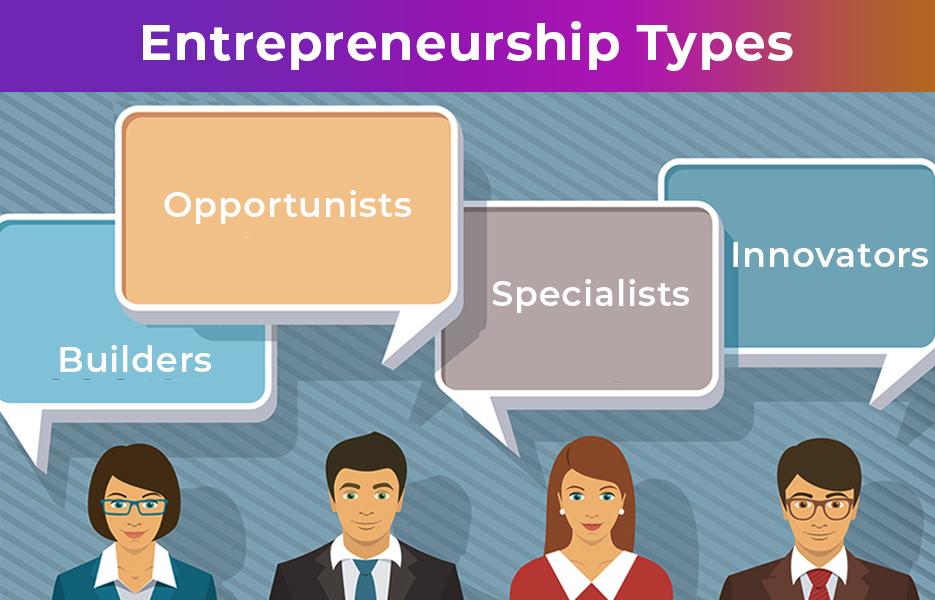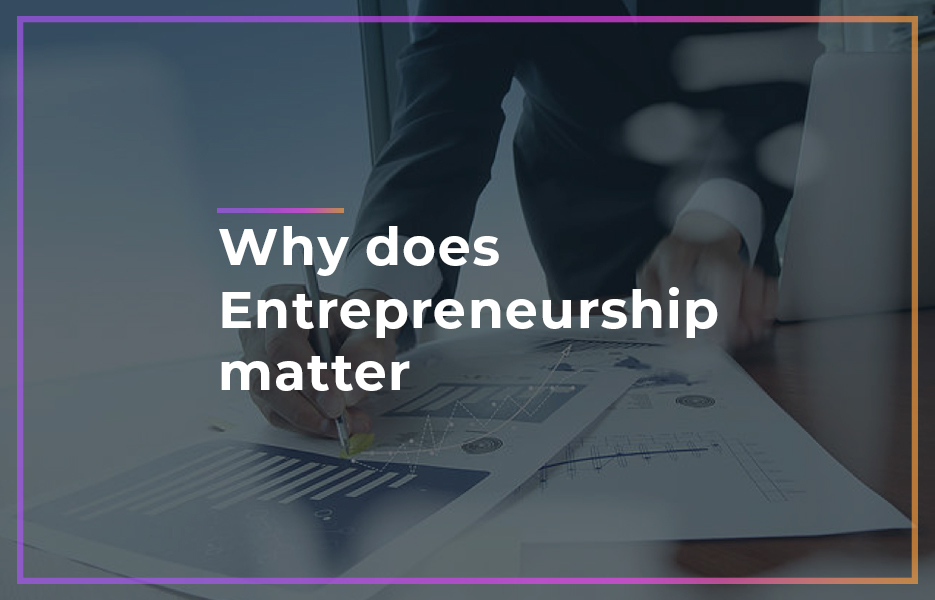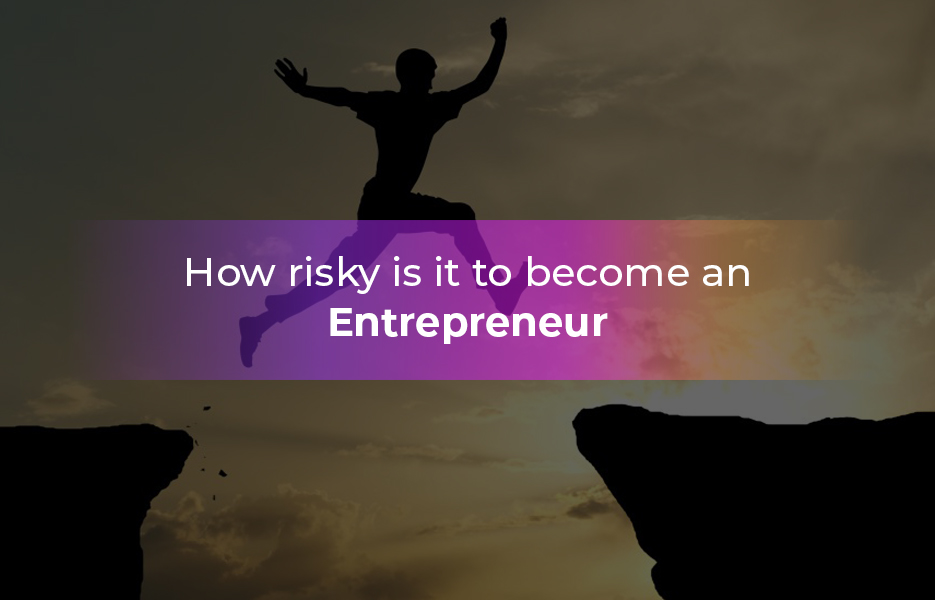What is entrepreneurship? Learn the definition and meaning of entrepreneurship
We’re guessing you’ve probably found this article because you’re thinking about becoming an entrepreneur. Maybe you’re learning more about it because you’re not sure whether working for yourself is for you or not. When it comes to the business of entrepreneurship, there’s lots to cover, so let’s jump right in.
What is the definition of entrepreneurship?

There’s a lot of different definitions around for entrepreneurship. Here’s a look at three different approaches:
Dictionary.com tells us that the definition of an entrepreneur is:
“a person who organizes and manages any enterprise, especially a business, usually with considerable initiative and risk”
Being more specific about entrepreneurship, rather than entrepreneurs, the Cambridge Dictionary states entrepreneurship is:
“skill in starting new businesses, especially when this involves seeing new opportunities”
The definition of entrepreneurship in use at the Harvard Business School is:
“Entrepreneurship is the pursuit of opportunity beyond resources controlled”
The fact that the Harvard definition doesn’t even include the word ‘business’ is interesting. It shows that entrepreneurs are chasing new opportunities, without necessarily having the resources required. That means entrepreneurs aren’t just building businesses – they’re making the most of all the opportunities they have. Think about Sir Richard Branson – he doesn’t sit in an office wearing a suit every day! He’s been involved in several world record attempts – including travelling across vast distances by hot air balloon and crossing the English Channel in an amphibious vehicle, as well as taking a trip to space.
The Harvard definition is less limiting than the previous two. Entrepreneurship is so much more than just business. It’s also about building your income the way you want it, on your own schedule. Your life, your decisions, your way. There’s a lot to think about before you get to that level of freedom in your work though, so let’s look further.
What does an entrepreneur do?
To keep it short and to the point: most of the time, an entrepreneur sets up new businesses. They might manage production, a location and resources, labour and capital. Entrepreneurs innovate, create business plans, and seek funding. They might not be working alone, but they provide the driving force to get the company off the ground.
What types of entrepreneurship are there?

There’s an ongoing debate about how many different types of entrepreneur there are. Some say four, others say five, and some say ten or more! We’ll refer to Forbes, as an undeniable authority in the field of business, who talk about four types of entrepreneurs:
Builders
We don’t mean people who build houses here – although some builders might become entrepreneurs! This type of entrepreneur is someone who can create very scalable businesses, very quickly. They look closely at what is required to make the business a success, which helps them make effective decisions. Often people who are entrepreneurs that are the builder type make $5 million within 2-4 years, and surpass that easily. They’re the kind of people who will create incredibly successful companies, sell them, and repeat the process.
Opportunists
Opportunists are the people who enjoy marketing and selling. They’re likely to invest at key times, and withdraw from the company at the peak of success – often impulsively. They might be seen to be lucky, or just in the right place at the right time. Their impulsivity can often be their downfall, as jumping in and out leads them to take risks with their capital.
Specialists
These are the people wo have trained to be specialists in their field. They’re prompted by completing education, apprenticeships or on-the-job training. Often this type of entrepreneur aims for an income target, and they don’t tend to exceed that.
Innovators
Innovating entrepreneurs are the ones who do what they love, and hit on a business opportunity as a result. They’re most at home tinkering with the intricacies of their products, and find the day-to-day business requirements a drain. They don’t care about the money, or the success of the business – they’re doing it because they love it.
Although there are people who fit into just one of these categories, there are many more who span two or more. if you want to find out what your entrepreneurial type is, you can do that here.
Why does entrepreneurship matter?

An entrepreneur is someone who aims to resolve problems. They’re leaders, and there’s a number of reasons that the worldwide economy needs them! Let’s take a look:
Creating jobs
Entrepreneurs employ themselves first. Then, as their business grows, and they need help, they take on staff to help them achieve their next goals. As the company thrives, more help is required, and so more jobs are created. Nationally, this helps boost employment rates, while supporting the families of the employees.
Creating change
‘Be the change you wish to see in the world’ is often attributed to Mahatma Gandhi. Although there’s a debate about the original source of the quote, it’s a good one for entrepreneurs to keep in mind. Some entrepreneurs envisage change so big it changes the entire world. Think Bill Gates and Steve Jobs! The aims of many entrepreneurs are much smaller, but aim to improve lives with products, ideas and businesses.
Being philanthropic
If you’ve been in business at all, we’re sure you can think of examples of greedy entrepreneurs. It’s not usually the case though! Because entrepreneurs make more money, they have to pay more taxes. (let’s side-step the issue of tax-dodging for now, just that we don’t recommend it!) Not only that, they’re often involved with charities, whether to increase awareness of an issue or raising funds. Some invest in solutions for poorer countries or the less fortunate in their communities. Some get involved in all of them!
Increasing income
By increasing employment, helping to grow new markets and paying more taxes, the economy benefits significantly from entrepreneurs. Without entrepreneurs, the economy can become stagnant.
What makes someone become an entrepreneur?

There’s many reasons that someone might choose to become an entrepreneur. Here are just a few reasons!
They aspire to be like other entrepreneurs. Success inspires ambitious people. Particularly when people identify with something about a successful entrepreneur, it helps them believe that they can do it too.
They want to work for themselves. Some people hate working for someone else. It can be difficult if you see your boss making poor decisions that won’t benefit the business! Making all the final decisions as an entrepreneur can help people become happier and more successful in their work.
They hate the 9-5 grind. This might be because it doesn’t work with childcare, or it could be that they’re more creative at 2am! Maybe it’s just because they hate being in the office 9-5, Monday to Friday and they want to set their own hours. Either way, when starting a business, working to their own schedule is just one advantage.
They like the thrill of the chase. Creating a business and building success can be risky! Many entrepreneurs get a buzz from it – it creates excitement and adventure. The thrill of smashing targets and winning awards is an incredible pay-off. Take it from us – the buzz when we won UK eCommerce Software Or Extension Of The Year at the UK eCommerce Awards was incredible!
They don’t have another option. Although some entrepreneurs set out to create businesses because of a burning desire to succeed, many are pushed into it. It could be that they’re struggling to get a job because of a criminal record, or lack of experience. It could be that, with family commitments or for health reasons, it is impossible to hold down a traditional job. Whatever the cause, finding employment and income for themselves is necessary. On top of that, they can build their income to whatever level they want – whether that’s ‘just enough’ through to ‘as much as possible’.
Who is an Entrepreneur?

The UK produces incredible entrepreneurs – here’s a quick look at some of the UK’s most high-profile to inspire you!
Sir James Dyson
Sir James is best known for rethinking the vacuum cleaner after he got frustrated with his Hoover’s performance. After many prototypes, he finally setting up his own manufacturing company, Dyson Ltd in 1993. Since then, the company has helped research and develop hundreds of products. As of 2017, Sir James’ net worth now exceeds £7.8 billion.

Sir Richard Branson
Sir Richard was an entrepreneur from a young age. His first opportunity at age 16 was a magazine called Student, followed by a mail-order record business. In 1972, he launched Virgin records, followed by Virgin Atlantic airline and a record label. He’s now estimated to be worth over £6 billion. Not only that, he was knighted in 2000 for ‘Services to Entrepreneurship’ – there’s a goal for aspiring entrepreneurs!

Duncan Bannatyne
Achieving fame from TV show Dragons’ Den, Duncan Bannatyne didn’t even have a bank account until the age of 30. A real rags-to-riches entrepreneur, Duncan started out with an ice cream van he bought for £450. From there, he expanded, moving into the care home industry, children’s nurseries and health clubs. His estimated net worth is over £280 million.

Jacqueline Gold
Jaqueline started her Ann Summers empire when her father bought four of the stores. Although she had a helping hand, when she visited a Tupperware party in 1981, she immediately saw an opportunity. Ann Summers parties are now held nationwide, and Ann Summers is a multi-million powerhouse of the UK high street, proving that there is huge demand for adult toys. She’s estimated to be the 16th richest woman in Great Britain. If you fancy following in her footsteps selling adult toys online, check out this post.

Victoria Beckham
Clearly, Victoria Beckham had an advantage when starting her business, having achieved fame with the Spice Girls in the 1990s. But she’s built her brand – both for her family and her fashion business. Victoria Beckham’s label regularly graces the pages of Vogue and whowhatwear, and won Designer Brand of the Year at the British Fashion Awards in 2011. Together with husband David, their children’s charity makes grants to individuals and organisations in need.

Dame Anita Roddick
Like many entrepreneurs, Anita opened the first Body Shop in 1976 to earn for her family. Eventually, with over 1980 stores worldwide, L’Oréal purchased the Body Shop in 2006 for £652 million. She was well known for her charity work, and on her death in 2007 she donated her entire £51 million estate to charities, rather than her friends and family.

Quotes from entrepreneurs to inspire your business

We’ve taken our cue from inc.com’s article about the most famous entrepreneurs of all time! If you want to know more about these incredible people, head there.
- “Don’t worry about being successful but work toward being significant and the success will naturally follow.” – Oprah Winfrey, media executive, actress, talk show host, TV producer and philanthropist
- “We can ill afford to rest on our laurels, even to pause in retrospect. Times and conditions change so rapidly that we must keep our aim constantly focused on the future.” – Walt Disney, animator, voice actor, film producer and founder of Disneyland theme parks
- “Dreams really do work. If you dream, and you think really creatively about what you are dreaming about – it will happen.” – John Paul DeJoria, co-founder of Paul Mitchell hair care products and The Patron Spirits Company
- “One night I had a dream, and in that dream a big black man appeared to me and told me what to mix up for my hair. I made up my mind I would begin to sell it.” – Madam C. J. Walker, wealthiest self-made woman until 1919
- “Don’t take it all too seriously. If you want to live your life in a creative way, as an artist, you have to not look back too much. You have to be willing to take whatever you’ve done and whoever you were and throw them away.” – Steve Jobs, co-founder of Apple Inc
- “Teamwork is the ability to work together toward a common vision. It is the fuel that allows common people to attain uncommon results.” – Andrew Carnegie, who led the expansion of the American steel industry
- “Beware of little expenses. A small leak will sink a great ship.” – Benjamin Franklin, one of the founding fathers of the United States, but also an author, printer, scientist and inventor
- “If your only goal is to become rich, you will never achieve it.” – John D. Rockefeller, American oil industry magnate and considered the richest person in modern history
- “My life will be the best illustration of all my work.” – Hans Christian Anderson, Danish author and travel writer
- “Information flow is the life blood of your company because it enables you to get the most out of your people and learn from your customers.” – Bill Gates, principal founder of Microsoft, but also investor, philanthropist and humanitarian
- “You can run a business any way you like, but you’ll run it better if you build it around your strengths.” – Duncan Bannatyne, Scottish entrepreneur and star of Dragons’ Den
- “Believe in yourself, never give up and go about your business with passion drive and enthusiasm.” – Peter Jones, British entrepreneur worth over £485 million and star of Dragons’ Den
- “To me, business isn’t about wearing suits or pleasing stockholders. It’s about being true to yourself, your ideas and focusing on the essentials.” – Sir Richard Branson, founder of the Virgin Group, controlling over 400 companies
- “I have never worked a day in my life without selling. If I believe in something, I sell it and I sell it hard.” – Estee Lauder, owner of one of the biggest beauty brands in America and the only woman on Time magazine’s 1998 list of the 20 most influential business geniuses of the 20th century
Socially conscious entrepreneurs

Most entrepreneurs do more than just create and manage their businesses though. Many, including big names like Bill Gates, Sir James Dyson and Sir Richard Branson commit time and money to creating change in the world. If you’re planning to become an entrepreneur, think about how you can effect change in the world. Obviously, if your business is a local one, you’re probably not going to be donating millions to charity! But it doesn’t have to cost a lot – and you can do a lot of good with your business too. Can you stock ethical or Fairtrade products, at minimal expense? What about supporting local events like school fetes? Can you inspire school pupils on work experience, or mentor final-year university students?
When you’re just starting out in your business, this might not be at the top of your agenda for a while. But there’s a good reason to put it in your long-term plans! As consumers become more socially conscious, so they are looking to do business with socially conscious companies. When you’ve started building your work with charities, or supporting local organisations, you can add this information to your website. You can talk about it on your social media. Particularly if you’re supporting an organisation that aligns with your brand, it can be a great way to market your business further.
Some entrepreneurs are trying to do good in the world as well as building their business, giving rise to the term ‘philantropreneur’. These are people who use their resources to create social change that is scalable and sustainable – it’s more than just giving to charity. Rather than treating the symptoms of the problem, philantropreneurs aim to solve the problem.
What skills do you need to become an Entrepreneur?

An article on Forbes claims that true entrepreneurship can’t be taught, but it can be encouraged. We’re sure there was no disrespect intended to the hundreds of professors teaching business at universities worldwide, but it is true, you don’t need to have an MBA to become an entrepreneur – many of the best-known millionaires don’t. That said, there are ten skills we think it’s essential to have as an entrepreneur:
Curiosity and imagination. As an entrepreneur, you’re aiming to solve problems, find niche opportunities and innovate. You’ll need to be passionate about what you’re doing, even when outside your comfort zone! Finding solutions to stumbling blocks in your business can take plenty of brainpower.
Time management. Without careful planning and deadlines, your business idea might be doomed to fail. Life can easily get in the way, and as your own boss, you don’t have to answer to anyone. It might sound great, but the reality is that it means you have to motivate yourself. Setting deadlines on your calendar can keep you motivated, rather than relaxing with that next box set on Netflix.
Strategic thinking. Being able to break a problem down to parts and find solutions for each is key. You’re going to be looking at why or how the problem exists, why it needs solving and how it can be solved.
Being efficient. If there’s a hundred things on your to-do list, trying to tackle them all at oncewon’t be effective. Being able to group tasks to work on at the same time is essential. Knowing when to switch between them is useful too. Don’t worry though – there are tools that can help you manage your tasks. Efficiency is a bit like a muscle too – the more you work efficiently, the better you’ll get at it.
Being resilient. Nobody builds a business, or an empire, without some setbacks somewhere along the way. Knowing that a setback isn’t likely to be personal, and the desire to keep going is essential. If you don’t want the setback to be your health, you’ll also need to practice self-care. Ensure you’re eating healthily, staying hydrated and take time for exercise and sleep (even you night owls and early birds!). Remember to take time for rest and relaxation too, so you don’t burn out mentally.
Communication skills. Accurate, succinct communication skills are essential. Don’t waffle on in emails to suppliers and so on – we’re all busy! Knowing how to get to the point without appearing rude or curt is appreciated. That said, being polite in your communications will never go out of fashion. Remembering your Ps and Qs projects a good image, and encourages people to work with you again.
Networking skills. Some of us hate networking, and we get it. But just as it takes a village to raise a child, so doesthe success of your business. You’re going to need reliable suppliers, partnerships, contractors and employees, and many more contacts. Network using social media like LinkedIn, you attend networking events or straight out call people. However you do it, you need to find your network.
Financial skills. Not knowing how to look after your business finances is a skill that can break a business. There is so much great quality advice on the internet now that you might not need an advisor! However, there’s no substitute for experience, so look for advice if you need it. Better to ask a ‘daft question’ than risk your success because you didn’t understand!
Marketing skills. No matter how fantastic your business and products, unfortunately it won’t sell itself. You need to create a brand, and sell it wherever – in person, online, in print media and so on. Create yourself a blog – people will want to hear from you, and it gives you a platform to share your expertise and your opinion. If you lack the skills, seek them out – YouTube is full of great tutorials. If you’re not visually creative, start with tools like Canva that make it easy to create branding and marketing tools. You can engage with graphic designers and social media experts when you’re ready to step up your business.
Sales skills. Although being a salesperson can be tough, get comfortable with it. You’re doing it for yourself, and reaching out to people can create even better opportunities than you’d thought of! If you’re in-person and find yourself lost for words, start telling people why you started your brand, and how you got to where you are. By the time you get to telling them about your products, they’re likely to be interested already!
Can I become an entrepreneur?

Absolutely. You just need an idea and a dream, and the dedication to making your dream a reality. Your idea doesn’t have to be a new one though!
Try finding a niche product to sell. Identify a great product, or a range of products and your target customers. Once you’ve done that, it’s as simple as finding your suppliers, and getting to work listing and marketing your products.
Imagine if there was a platform that helped you do all of that? Wouldn’t life be easy? Well, luckily for you, there is! When we developed Avasam, we wanted to make it as easy as possible for people to start selling online – including getting started at no cost.
Ideas for becoming an entrepreneur
- eCommerce store owner – start sourcing from suppliers now with Avasam
- Freelancer – writer, bookkeeper, graphic designer
- App creator – chatbots, social media apps
- Service business – beauty therapist, cleaner, pet sitter
- Consultancy business – party planner, business consultant
- Marketing – PR, influencer, SEO specialist
- Affiliate marketing – Amazon, Clickbank, etc
- Blogger – Product reviews, niche blog, travel blogger
- Vlogger – YouTube or Vimeo channel, Twitch
- Flipper – buying and selling domain names, websites, or houses Foreign language translator
- Estate agency
- Photographer – product photography, selling photos
- Stockbroker (buying and selling stocks)
- Home tutor (online or offline)
How risky is it to become an entrepreneur?

It can seem to be extremely risky to become an entrepreneur. Leaving paid employment, risking personal finances, your health and time with your family can leave you exposed to huge problems. You might end up needing to work another job while you build your business as a side hustle until it takes off. Here’s some of the top reasons that people think are a barrier to becoming an entrepreneur:
- “I don’t think I can raise enough money.”
- “I don’t have an idea.”
- “I’m discouraged by the high failure rate of businesses.”
- “I don’t have the right skills.”
- “I worry about balancing business and family life.”
- “I’m worried about taxes and regulations.”
- “The competitive barriers are too high.”
- “I don’t think I could hire people with the skills I need.”
These aren’t the only reasons putting people off either! But with preparation and planning, you can reduce the risk you’re exposed to.
Where is the best place in the world to become an entrepreneur?
Business Insider’s list claims that the United States is the best place in the world to be an entrepreneur, followed by Germany and the Netherlands. This comes from the World Economic Forum’s 2018 global competitiveness report – the USA scored 86.5 points out of 100 in the ‘business dynamism’ category. This category considered factors such as the cost and speed of starting a business, attitudes entrepreneurs towards risk, and the willingness of companies to embrace disruptive ideas.
Although the USA might be the best place to start your own company, you don’t have to move there to get going. With visa limitations and the need to uproot your family, it might not be best for you. You can start an online business pretty much anywhere in the world, as long as you have the right tools.
- USA
- Germany
- The Netherlands
- Sweden
- Israel
- Denmark
- The UK
- Finland
- Norway
- Ireland
When is the best time to become an entrepreneur?

Let’s tackle this question in a couple of ways.
Age does not matter. Although there are examples such as Sir Richard Branson and Mark Zuckerberg who started out young, there are just as many people who are older and becoming entrepreneurs. Duncan Bannatyne didn’t start out in business until he was 30, and there are countless examples of older entrepreneurs. Research from MIT found the average age of an entrepreneur in a high growth company is 45 years old, which means that it really isn’t ever too late to become an entrepreneur!
In terms of the best time of the year to become an entrepreneur – well, you might think the start of the year. New Year’s resolutions and a time for change might drive you, but it’s claimed that only 8% of resolutions started on January 1st are successful, so it might be better to wait. Other people might start goals at the start of their financial year, while Forbes recommends using the start of the new school year to get going. It’s a good idea too – people are relaxed and fresh from summer holidays. Everyone who attended school is used to the freshness of their new stationery and shiny new shoes driving their ambitions. For the northern hemisphere, September is summer’s end, and longer nights keep us indoors rather than out socialising, and families with children return to routine, so it is a great time to implement new regimes and tasks. It doesn’t matter what time of year you start really though! It is more important to set your goals and deadlines and work to them.
If we’re looking at the best time in history to become an entrepreneur? There were waves of entrepreneurial activity in the industrial age, from the 1860s to the 1880s, then again between 1910 and 1929 (although eclipsed by wars and the Great Depression). The most recent wave of entrepreneurialism in history was around 1985, with the rise of Silicon Valley companies. Since we can’t go back in time and take advantage of those periods, there’s never been a better chance than now – as long as you have done that all-important research, of course.
So, age doesn’t matter, there isn’t a specific time of year that’s best, and we can’t go back in time. That means today has to be the best time to get started! With tools such as Avasam available, your journey to entrepreneurship can be easier than ever. It’s safe to say, there’s never been a better time to get started on your entrepreneurial journey.
Is there an easy way to become an entrepreneur?

The answer to this is yes and no. Yes, there are easy ways to start your business, especially with the right tools. However, don’t think that it’s completely effortless! Although getting started can be easy, keeping the momentum building can be a challenge. It also depends on what you decide to pursue. There are no end of small business ideas on the internet! Check our tips for becoming an entrepreneur, make sure you know your audience and do your due diligence.
Great tools for entrepreneurs
- Quickbooks – for simplified accounting
- Canva – for professional looking designs without Photoshop
- Fiverr – to find flexible talent Google Docs
- Dropbox
- Evernote – for keeping track of your notes
We talked about different business ideas for selling on the blog here. If you sign up to use Avasam, you can start your business immediately with no upfront capital required. We made it free to start, because from the whole point of Avasam is to make selling simple.
In addition to being free to start, we’ve secured some of the best suppliers, with tens of thousands of products now available for you to source. Because our DropShipping suppliers are UK-based, you won’t encounter the problems with dealing with overseas suppliers – time zones, communication issues and so on. All you need to do is sign up, and you can start selling quality products straight away.
If you’ve checked our tips for becoming an entrepreneur, you’ll have already thought about your target customers. With that knowledge, you will know the right sales platforms to sell on for your customers. The good news is, you won’t need to do any complicated setups – Avasam is automatically connected with them too.
8 tips for becoming an entrepreneur

1 Decide you don’t want to stay where you are.
Facing that you’re fed up with your current circumstances also means acknowledging that nobody else is responsible for your happiness. Many people think of excuses: the government, the economy, partners and family members. Once you realise that you’re in control of your own happiness, you can take the next steps in your future.
2 Find the right opportunity for you.
Do your research before you jump ship from your current employment. Think about what you enjoy, what might suit your personality and how it can work around your personal circumstances. There’s three simple ways to think about how to use your skills:
Do what you already know how to do. If you’ve amassed skills from your career, think about how you can make use of those skills in order to work for yourself.
Do what other people do. Research business ideas. Although there might be a thousand (or more!) businesses like your idea, your approach might just be the most successful.
Solve a problem. Check to see if there’s a gap in the market. Could you launch a product, or service that would help people? Make sure you do your due diligence before starting – and definitely before parting with any cash.
3 Perfect planning prevents poor performance.
This is a well-known piece of advice for good reason. Putting effort into your planning can help you build your business faster, keep you focused and give you confidence. Your overall plan might only be one page long, but planning smaller tasks will help you maintain your momentum.
A good way to start your planning process is to refer to seven key business questions:
Who are your customers, your employees, suppliers, competitors?
What is your strategy? Think about corporate strategy, marketing, products and business strategies
Where are you going to be? Marketplaces? What facilities and distribution do you require?
When are things going to happen? Without deadlines and plans, you may lose the drive. Add dates to your calendar and stick to them.
Why will things happen? Who is taking charge of the leadership? What about communications and company culture? It might be just you for a while, but think about it anyway!
How will you achieve your goals? Look at marketing, operational plans, metrics and incentives.
How much is the business going to need? Create investment plans and business cases.
4 Know your audience first
This might touch on our previous point – but before you take action, make sure people want your products or services. Don’t assume that everyone in the world will want your great idea. There are plenty of examples in history of great ideas that sank without a trace. (Betamax at home, anyone? What about a minidisk player? Nope, we thought not!) Don’t gamble on your idea being great without doing your research first. Check industry articles, use Google and check Census data before you even think about parting with your hard-earned cash.
5 Look after the pennies
When you’re starting out, you’re probably going to be your only investor. That means you need to keep a tight rein on your personal finances as well as your business finances. Work out how much you have put away in your savings. How much you can afford to invest in your business without putting your future at risk?
If you’re going to be looking for external funding, you will need to illustrate your competence with money. Get your personal finances straight, and consider making use of a money management system. If you’re not sure where to start, get some advice from financial advisor. It’s better to be informed, and being prepared means there’s less chance of nasty surprises down the road.
6 Get your support in place
Start at home. Make sure you have the support of your family, and as many friends as possible. Once you’ve got your personal support network in place, start to look at what your business needs. Find your advisors, partners and suppliers. When you show your support for your business idea, and can show others do too, you’re more likely to succeed.
Also, use platforms like LinkedIn to grow your network. Attend networking events, and listen to the advice people have to give – you can learn from their advice! When you’re at those events, don’t dismiss anyone. You never know when the most unlikely person might be able to make an introduction. Treat everyone with respect, including cleaning and waiting staff.
Your support isn’t just the people around you though. Make sure you secure the right tools and technology for your business, including your website and other social networks.
7 Create value in what you do
Ever felt annoyed by someone selling to you? Yep, us too. Rather than going for the hard sell approach, think about creating value for people. Show them you want to serve them, or how your products will contribute to their lives. Use that to build your marketing, and your brand, and you’re more likely to be more successful.
8 Market yourself
Nobody will use your business, or your services if they don’t know it exists! Use social media to shout about your business to the world. Look at what your competitors are doing on social media. What about the businesses you hope to be your competitors one day, when you’ve grown your business sufficiently? You need to emulate their success, and social media is just one way you can help get your brand known. We’ve published some great advice about how to grow your Instagram followers, and using your bio and captions effectively. That said, there’s plenty of advice about how to manage your social media, and which platforms you should use. Make sure you do your research, and make the right decisions for your business.
Don’t just rely on social media though. There are plenty of ways you can get word out about your business on top of that! Use word-of-mouth marketing, blog posts, articles in newspapers, email marketing, add to local newsletters and so on. Building your brand in your local community can help build your support network too, so take part in local events. And last, but absolutely not least, don’t discount the value of calling people.
Becoming an entrepreneur can be nerve-wracking, if you let it be. There will be times where you’ll be crossing your fingers, touching wood and all the other superstitious things that things will go well – that’s normal. But with great planning, plenty of research, the right support and the right tools, there’s no reason that you can’t do it! There are two things that every entrepreneur has:
– The will to succeed
– The desire to get started
There’s never been a better time than right now to start your business, and to free yourself from the 9-5. Talk to us today about how Avasam can support you with becoming an entrepreneur. We’ve already helped hundreds of entrepreneurs on their way to success – we can’t wait to help you too!
This post contains affiliate links. If you use these links to buy something, we may earn a commission. We only use referral links for businesses that we would use ourselves. Thanks for your support!




DropShip products from verified suppliers to diversify your inventory and scale your eCommerce business